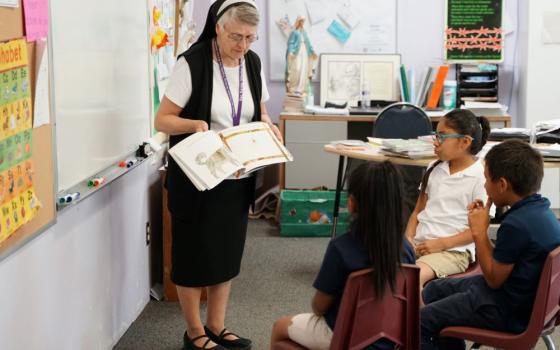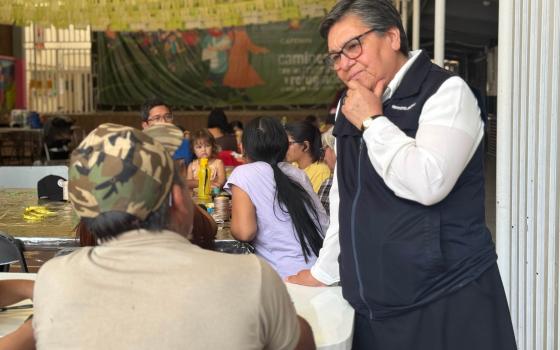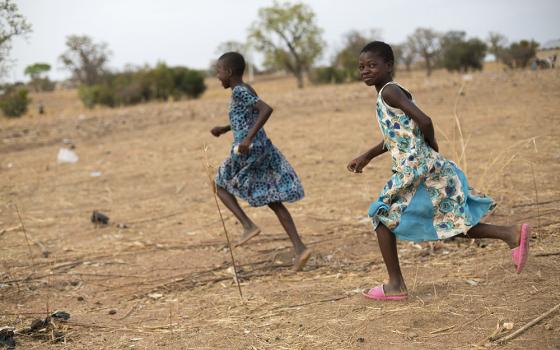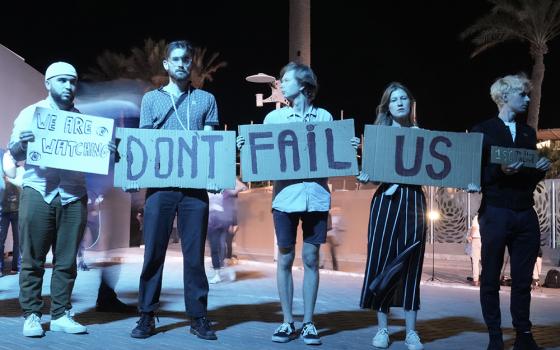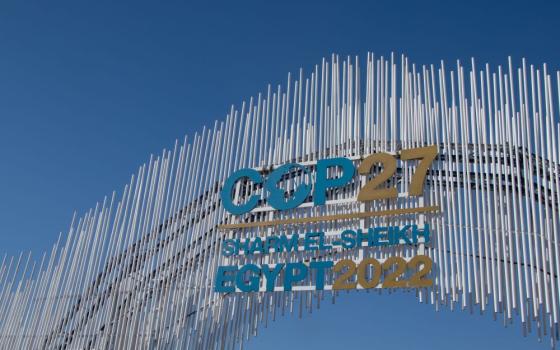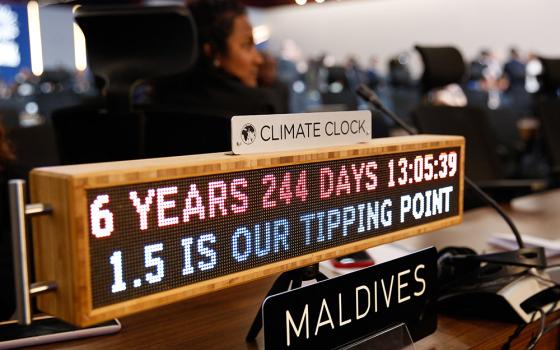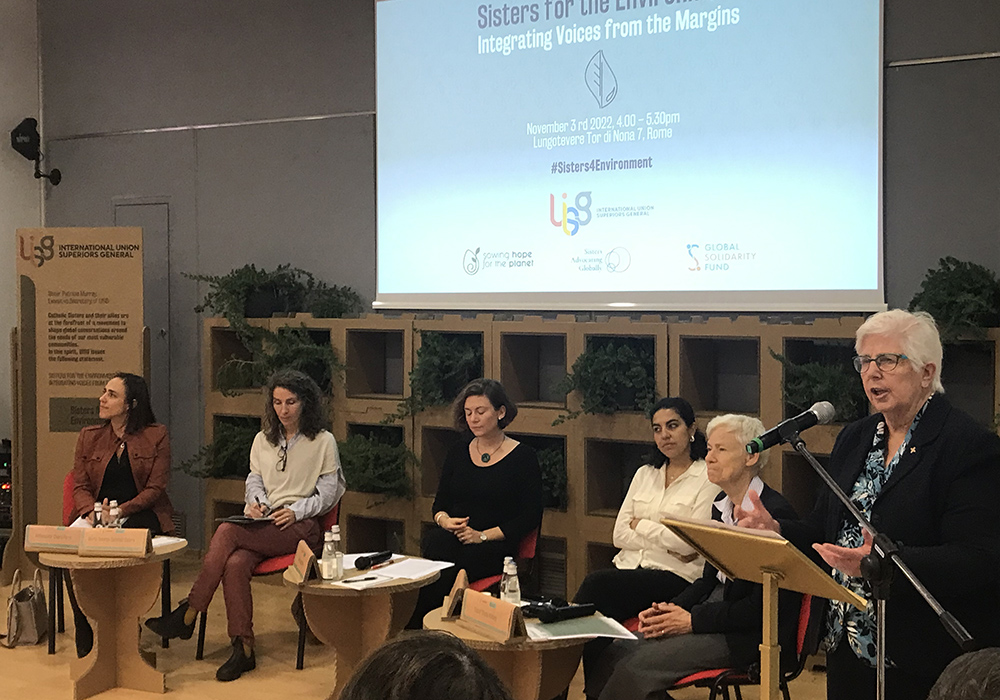
Loreto Sr. Pat Murray gives introductory remarks at the International Union of Superiors General's launch of the statement "Sisters for the Environment: Integrating Voices from the Margins" on Nov. 3 at UISG headquarters in Rome. (Justin McLellan)
Catholic sisters are calling on the global development community to engage with them in "promoting and realizing integral environmental solutions" at the COP27 U.N. climate summit and the COP15 U.N. biodiversity summit.
At a Nov. 3 launch event in Rome, the International Union of Superiors General, which represents over 600,000 Catholic sisters worldwide, presented a statement, "Sisters for the Environment: Integrating Voices from the Margins," intended to "reflect and clarify the response of Catholic sisters to the environmental challenges of our time."
"We're saying to the leaders of the world, 'Listen to the people who are suffering,' " Loreto Sr. Pat Murray, UISG's executive secretary, told Global Sisters Report. "Bring them to the table, include them in the conversations and solutions, involve people at the grassroots level."
UISG's statement rests on three pillars: It calls on global leaders to integrate "responses to climate change and biodiversity," "care for people and our planet" and "vulnerability from the margins" into the published decisions of both U.N. summits.
COP27 opened Nov. 6 in Sharm el-Sheikh, Egypt, and runs through Nov. 18, and COP15 will take place Dec. 7-19 in Montreal.
Environmental activists point to both summits as crucial opportunities to achieve the goal of limiting global temperature rise to 1.5 degrees Celsius adopted at COP21 in the 2015 Paris Agreement. After disappointing outcomes from last year's COP26, many are calling for more concrete measures to hold nations to their emissions reduction goals and to provide restorative justice for communities already suffering the harshest effects of climate change.
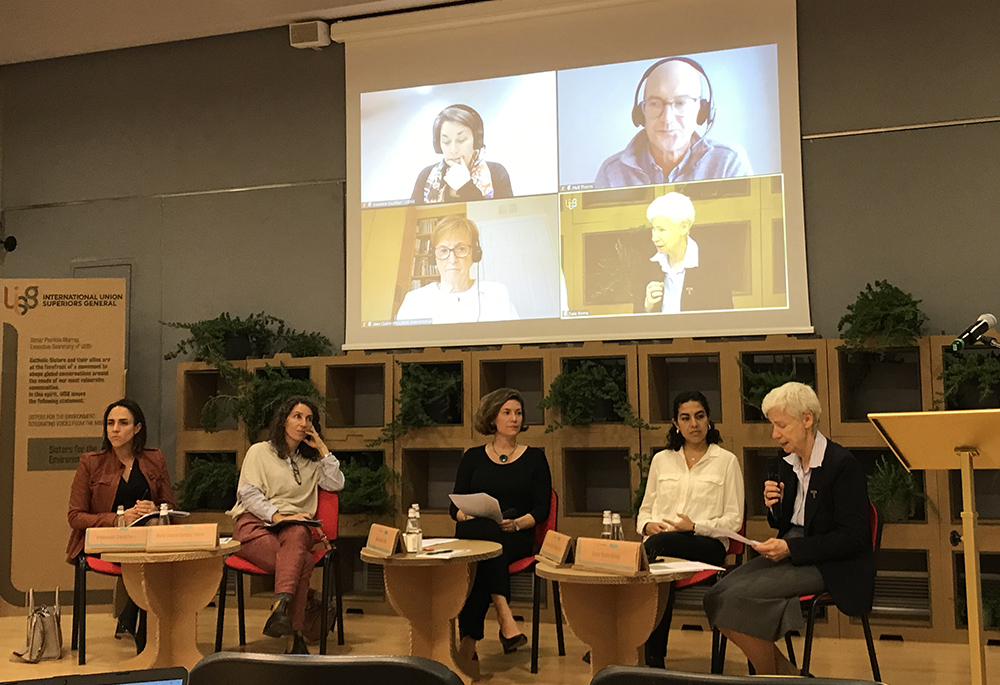
Sr. Sheila Kinsey of the Franciscan Sisters, Daughters of the Sacred Hearts of Jesus and Mary speaks during a panel discussion at the International Union of Superiors General's launch of the statement "Sisters for the Environment: Integrating Voices from the Margins" on Nov. 3 at UISG headquarters in Rome. Other in-person panelists were, from left: Chiara Porro, Australian ambassador to the Holy See; María Dolores Sánchez Galera from the Dicastery for Promoting Integral Human Development; Giulia Cirillo, UISG's advocacy project coordinator; ad Catalina Salome Hinojosa Lopez, co-coordinator of Agriculture and Justice Village at the Economy of Francesco. Projected clockwise from the bottom left are Sr. Jean Quinn of UNANIMA International; Josianne Gauthier of CIDSE; Neil Thorns of the Catholic Agency for Overseas Development; and Kinsey. (Justin McLellan)
Presenting the statement was Sr. Sheila Kinsey, a member of the Franciscan Sisters, Daughters of the Sacred Hearts of Jesus and Mary and the coordinator of Sowing Hope for the Planet, a project meant to mobilize Catholic sisters to take action in combating climate change. She was involved in a number of dialogue sessions with Catholic sisters across African nations to seek input from the communities they serve in producing their statement.
"We're really getting to their voice, where the people are saying what their needs are," she told GSR. "Of all the things we want to deal with is loss and damage, and we want to deal with financial ways to address that. We're looking at who is responsible and how we can make reparations."
The final decision that resulted from the COP26 in Glasgow has been criticized for inadequately addressing the subject of loss and damage. While the Glasgow Climate Pact discusses the subject, it ultimately failed to establish a damages fund for countries especially vulnerable to the consequences of climate change, such as low-lying island nations.
María Dolores Sánchez Galera, the coordinator of the research and reflection unit of the Vatican's Dicastery for Promoting Integral Human Development, said during the panel discussion that addressing loss and damage was "the critical aspect of the COP on biodiversity."
Advertisement
In its statement, UISG calls for a framework that "explicitly ties climate adaptation to social justice" and recognizes "the ecological debt owed by the Global North to countries bearing the brunt of an environmental breakdown they haven't caused."
At the statement launch event, video testimonies from sisters from across the globe shared how they support and advocate for communities affected by disregard for the environment.
In one video, Sr. Nathalie Kangaji, a member of the Congregation of Our Lady Canonesses of St. Augustine in the Democratic Republic of Congo shared how the "systematic plundering and uncontrolled exploitation" of the country's minerals result in many communities being forcibly and illegally relocated while producing severe water, air and soil pollution. In response, she founded a legal and judicial aid center in the mining town of Kolwezi to defend the rights of the local population and train them to pressure the government on the misuse of natural resources through legal mechanisms.
A group of Catholic sisters from various organizations is present at COP27 to represent the experiences of sisters like Kangaji. Among them is Sr. Jean Quinn, a Daughter of Wisdom and executive director of UNANIMA International, a nongovernmental organization advocating on behalf of marginalized groups before policymakers, primarily at the U.N.
"The challenge will be to be heard in the right places and with a prophetic voice and to raise our voices," she said while virtually participating in the UISG event. "We'll have the opportunity to amplify the lived experience of the people from the grassroots, the people that our sisters tell us about."
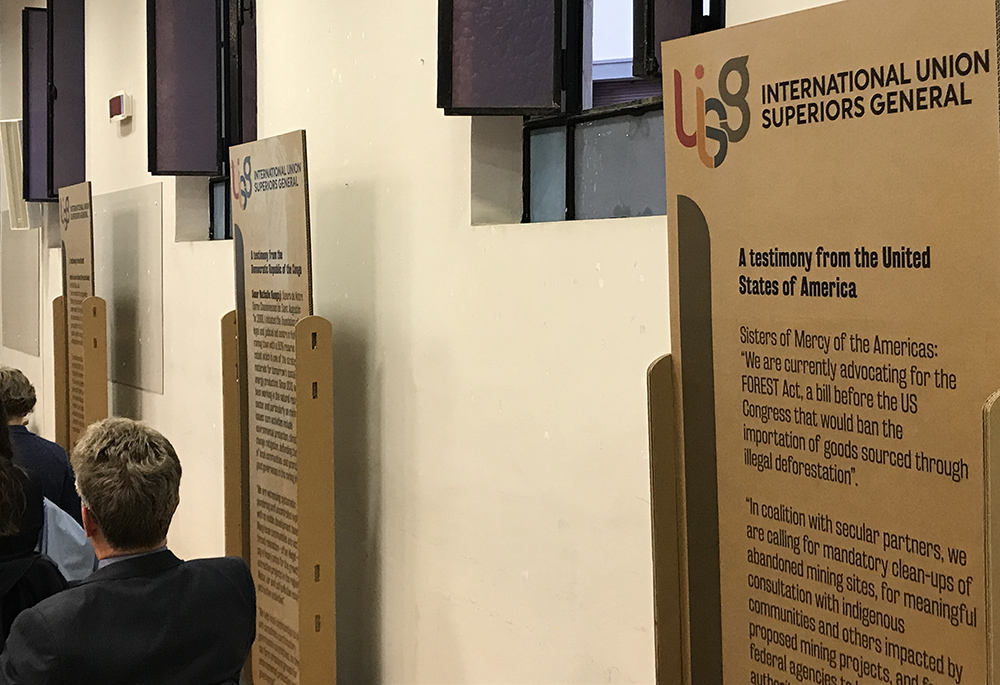
Written testimonies of Catholic sisters working with marginalized communities around the world line the walls of the headquarters of the International Union of Superiors General at the Nov. 3 launch of the statement "Sisters for the Environment: Integrating Voices from the Margins" on Nov. 3 in Rome. (Justin McLellan)
Murray said that in addition to reporting on the detrimental effects of climate change and providing witness to those on the margins of society, the voice of Catholic sisters must also serve as an example of change.
"Catholic sisters are doing a lot of positive things: planting trees, divesting from fossil fuels, changing their own practices so that they are more sustainable," she told GSR. "We need to raise up the positive actions being done by individuals, local communities, and parishes. They are like the mustard seeds: They coalesce and make that big tree of change."
The UISG statement's final call to action urges leaders to recognize "that women religious are uniquely placed to advocate for and with the communities they serve, and have a role to play in bringing local voices into global conversations."
Admittedly, Kinsey noted that advocacy in this form requires a shift in attitude for Catholic sisters, who she said are often used to discreetly serving their communities.
"Many of the sisters do things rather quietly, but now, this is a new frontier," she said.
"The future is in our hands, and we're the people for this time."

